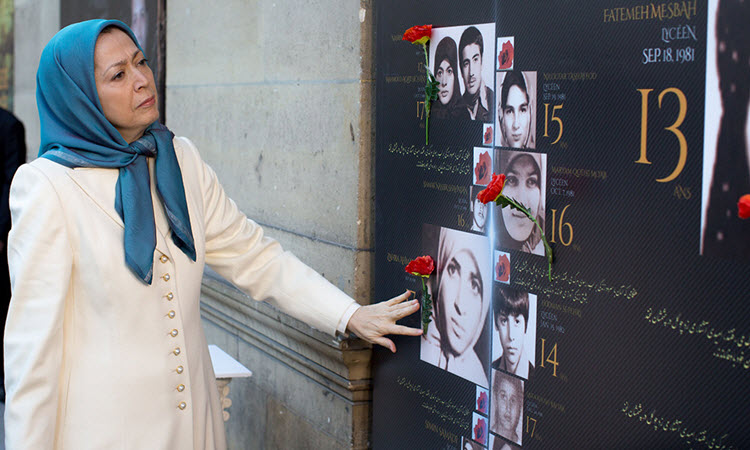
The President-elect of the National Council of Resistance of Iran (NCRI), Mrs Maryam Rajavi, gave her thoughts on the World Day against the Death Penalty. She hailed the brave men and women who have lost their lives to the religious dictatorship in Iran.
She highlighted that the regime has killed more than 120,000 people including the 30,000 political prisoners who died because of their political beliefs. More people have been executed in the past year than during most of the years of Khamenei’s rule. She pointed out that the rate of executions is continuing relentlessly.
In August, a member of the Legal and Judicial Committee in the regime’s parliament said that there are 4,500 undecided prisoners on death row.
The majority of the people in Iran are executed under the pretext of combatting drug-related crimes, said Mrs Rajavi, yet there have been numerous reports indicating that the Iranian Revolutionary Guards Corps (IRGC) play a large role in smuggling and distributing drugs in Iran. In fact, government officials from Azerbaijan, Afghanistan and Nigeria recently discovered that the IRGC and Iranian regime was involved in drug smuggling.
In March last year the Interior Minister of Iran, Rahmani Fazli, said: “Undoubtedly, part of the dirty money of drug trafficking gets funneled into the country’s politics, elections and transfer of power.”
Mrs Rajavi said: “Accordingly, the executions carried out by the clerical regime is a premeditated crime. These executions are against genuine Islamic standards. They violate international standards of fair trials.”
Last year, the UN Secretary General said: “The majority of executions were imposed for drug-related offences – crimes that do not meet the threshold of the ‘most serious crimes’ as required by international law.”
The Human Rights Council, UN High Commissioner for Human Rights, the Special Rapporteur on extrajudicial, summary or arbitrary executions, and the UN Office on Drugs and Crimes all agree that these charges do not meet standards justifying punishment with execution.
Mrs Rajavi said that the death penalty “faces growing opposition and general detestation in Iran”. She added: “The movement to obtain justice for victims of the massacre in 1988 has expanded in recent months cornering the mullahs with regards to continuing the executions.”
Members of the regime’s parliament recently put forward a plan to commute the death sentences for some of the people charged with drug-related crimes in a “theatrical bid” to contain social discontent.
Mrs Rajavi explains: “As far as the Velayat-e Faqih regime is concerned, it is not able to give up executions and torture until it is overthrown. It sees executions as its lifeblood. This is why the majority of the regime’s leaders, from Khamenei, Rafsanjani and Jannati to its Chief Justice, head of the Justice Ministry and Bassij, rose to defend the massacre in the wake of the public dissemination of the audio file of Mr. Montazeri’s remarks on the massacre of 30,000 political prisoners, calling it ‘the supreme leader’s miracle’, their ‘honor’, and ‘a historic and revolutionary decision by the Imam (Khomeini)’.”
These confessions are explicit. There is no doubt that a crime against humanity was committed.
Mrs Rajavi called on the international community to “provide the arrangements for the prosecution of the clerical regime’s leaders, particularly its leader Khamenei, in the international courts for the massacre of 30,000 political prisoners”.
She also called on western governments to condition their relations with Iran on a moratorium on executions and on the young people, especially the young, to “stand up to and resist against the policy of executions and killing”.
She ended: “The Iranian people and Resistance will bring justice to the clerical regime for violating their human rights. This Resistance has risen up to create a society that bears no trace of the death penalty, torture, and inhuman verdicts issued under the mullahs’ regime. Instead, it will be ruled by laws based on forgiveness, compassion, humanity, and relations based on friendship and tolerance.”







